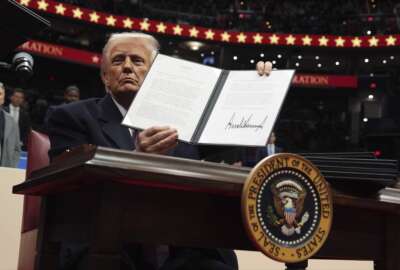OMB, Congress to put grant-making process under more scrutiny
Rep. James Lankford (R-Okla.) said he will hold hearings to see how to make the federal grant process more transparent. The administration merged two existing...
wfedstaff | June 4, 2015 1:22 pm
Congress and the administration have spent much of the past three years focusing on fixing how agencies buy $535 billion in goods and services each year. But lawmakers and the Office of Management and Budget now are moving their oversight to the high-dollar value grant-making process, which accounted for more than $600 billion in federal awards in 2010.
The House Oversight and Government Reform Committee plans to hold a series of hearings in the coming months to make the grant-making process more transparent.
Rep. James Lankford (R-Okla.), chairman of the Subcommittee on Technology, Information Policy, Intergovernmental Relations and Procurement Reform, said he wants to look at the grant-making process, make it easier for citizens to understand who won the grant and what were the results or outcomes produced by the money.
“I don’t want to make grant writing as difficult as contracting, and we don’t want to create a Federal Acquisition Regulations for grants. But we do want to create some level of accountability,” he said in an interview with Federal News Radio. “For instance, we should know who was awarded the grant and people should be able to see the grant request itself and understand why it earned spot on merit. We need some transparency about who was in selection process.”
At the same time, OMB Director Jack Lew issued a memo Friday merging two existing grant oversight boards into a new Council on Financial Assistance Reform.
The council, an interagency group of agency officials, replaces the Grants Policy Council, which OMB established in 1999 and the Grants Executive Board, which OMB established 2004.
Lew said the goal is to “create a more streamlined and accountable structure to coordinate financial assistance. Using existing resources, the council’s activities will include providing recommendations to OMB on policies and actions necessary to effectively deliver, oversee, and report on grants and cooperative agreements, as well as sharing with executive departments and agencies best practices and innovative ideas for transforming the delivery of this assistance.”
Lew said the new council is yet another piece to the President’s Campaign to Cut Waste.
“Based on recommendations from both federal and non-federal grants stakeholders, the council will implement reforms to reduce grantee reporting burden while focusing on performance to improve outcomes,” wrote Danny Werfel, OMB controller in a blog post from Friday.
The grant-making process came under intense scrutiny when agencies were issuing funds through the Recovery Act.
In June Government Accountability Office testified before Lankford’s subcommittee about the lack of internal controls by grant-making agencies, such as pre-award reviews and documenting the grants award decision process.
The new council will try to address several of the shortcomings GAO and the subcommittee found.
Lew said the council will coordinate the development of and implementation of standardized business processes, data, metrics and technology.
“The council will also work with key stakeholders in coordinating the streamlining and simplification of the financial assistance process by eliminating unnecessary regulatory, reporting and grant-agreement requirements and by increasing flexibilities for satisfying grant requirements,” Lew wrote.
Lew added the council also will “identify emerging issues, challenges and opportunities in grants management and policy, including as appropriate, improvements to the competitive grant-making process. The council will also serve as a clearinghouse of information on innovations and best practices in grants management, and as appropriate, sponsor and lead new efforts for innovation.”
OMB tried to do this with the Grants Line of Business in 2006 and made some progress by naming four agencies to serve as grant system providers for the rest of government. OMB also launched Grants.gov in 2003 as a one-stop shop to find and apply for grants.
The Obama administration upgraded Grants.gov in 2009 to be able to handle the expected traffic from the Recovery Act.
GAO and OMB found Grants.gov did not receive proper funding or upgrades over the years to be able to handle the increased traffic. OMB asked agencies to pass-the-hat for about $6 million in new hardware and software to be able to handle the traffic from the Recovery Act.
On Sept. 16, the Department of Health and Human Services awarded Digital Management Inc. a five-year $32.4 million contract under the 8(a) program for a host of IT services, including applications management, application platform management and project and IT management, for Grants.gov.
RELATED STORIES:
OMB calls for a review of grant application systems
OMB tells all agencies to go back to Grants.gov
Copyright © 2025 Federal News Network. All rights reserved. This website is not intended for users located within the European Economic Area.
Jason Miller is executive editor of Federal News Network and directs news coverage on the people, policy and programs of the federal government.
Follow @jmillerWFED






